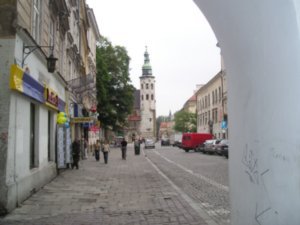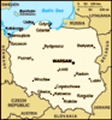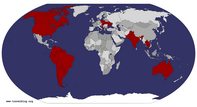Advertisement

 Morning Meander
Morning Meander
On the way to the Kazimierz...Poland’s premier urban attraction, Kraków’s beauty and style live up to its reputation. I dare say, with reluctance, after having come from Lviv that it is anti-climatic, almost a disappointment. Only here a day now, I can assure you Kraków is a marvelous place: modern, vibrant, and aesthetically pleasing. Poles are overtly proud of their city, as well they should be. Yet, having arrived from Lviv, I cannot help but feel that John Paul II’s hometown (his image is all over the place) is but a playground for the armies of visitors it hosts from around the world. Where Lviv is yesterday, or many years ago, Kraków makes it absolutely clear it has both feet planted in 2005, and looks in no direction but forward.
Multi-flagged electric golf carts shuttle tourists from sight to sight within the Old Town, or Stare Miasto. Indian, Chinese, and Mexican restaurants compete for the hungry Dutch, Americans, and Italians, whose cameras incessantly point and click in every direction. How shameful is it to pass a Pole on a street corner dressed in a Mexican serape, sombrero on his head while waving in passersby to the Tequila bar? It reaches beyond absurdity. Street performers juggle, mime,

 On the Vistula
On the Vistula
Not scenic, but a reminder of Poland's great waterway...and stand stiff as statues, to collect the few złote they can muster. Sketch artists pencil in caricatures of jovial Spaniards; the twin-towered St. Mary’s Church provides the background. Tacky shops sell the usual t-shirts, cheap chess sets, and jewelry. A slew of them line an interior hall of the main square, the Głowy Rynek. Nothing there is worth buying, much less even glancing at. British school groups whine about this and that. Two American girls complain about receiving hot milk for their coffees as opposed to cold. Pigeons land on the shoulders of Belgians posing to be photographed while holding out breadcrumbs. Their faces express delight although they are no more than a target for these disease-carrying flying rats to deposit their droppings. The pigeons aggressively spiral among the spires of the Rynek Głowny overhead, as if auditioning for a famous Hitchcock film. The whole scene is just awful.
But then my espresso arrives, a trumpeter plays a melancholy tune from St. Mary’s that quiets the multitude if for a short time. I dine on pierogi and gołabki in a tiny eatery at the end of Sławkowska . (No, wait: I feed off pierogi and gołabki. I love the

 Huh?
Huh?
How'd you like this on your license plate...stuff so much, they may as well put it in a trough.) The bank turned over my traveler’s checks in a matter of minutes and with a welcoming attitude. People in Kraków are helpful. They smile. If in a bind, they try to lend a hand as much they can. While negotiating my neat and spotless three-room apartment, the proprietress gave me a quizzical look when I battered her with questions about a genuine showerhead in the bathroom and hot water that actually comes out of the faucet. “All the time, of course. Why wouldn’t it?” I order a beer and it hits the table before the winter snows blanket the outdoor café. The Internet cafés’ servers are ultra-modern and dispatch my messages the moment I click “Send”. Everything here works. But modernity comes at a price: the authenticity I knew in Ukraine has disappeared. But it is an adequate quid-pro-quo.
Whoever was responsible for creating the Polish language must have had a torrid and burning love affair with the letter z; I think it appears in half the words and multiple times in each. Moreover, consonants, from time to time, are accented. Take for example, Zamość. What gives? Some

 In High Demand
In High Demand
Immigration line outside U.S. Consulate...vowels, like a and e, take a funny-looking cedilla, and become ą and ę. On the whole, the Polish language is what Ukrainian would look like if not for the Cyrillic alphabet. Nevertheless, now that all the letters are roman, it does not necessarily guarantee you success in pronunciation. Sounds are unfamiliar and do not correspond to common letter combinations. I am getting used to it after a day, but not before butchering it a more than a few times. Even the main phrases I have to write and rewrite in my notebook. They eventually sink in. I do not see myself as a master scholar of Polish anytime soon.
Protected not only by municipal police, but also by national guards brandishing automatic weapons, the U.S. Consulate in Kraków pulls in long lines of Poles seeking visas. On the same street with the German and French consulates, lines snake around newspaper stands and kiosks for applicants to gain entry to be interviewed. Next door, lobbies to the French and German consulates stand barren and hollow. With little hesitation, I made my way to the head of the line and requested entry as a U.S. citizen. It was granted immediately and

 Do You Speak English?
Do You Speak English?
Someone needs to be consulted before signs are created...I was shown to the Passport Services section where I needed pages added on to my passport, now riddled with stamps. I filled out the documents under smiling photographs of George and Dick, and was told that it would be a “while” for my background to be checked and the paged to be attached. So, now accustomed to having vast portions of my life in Eastern Europe taken away from me while waiting, I dug in for a war of attrition. Only thirty minutes later, the Polish attendant called me to the window.
“Mr. Incorvati”, she smiled. “Your passport is ready.” She slid it to me under the glass. It was in perfect order. Thirty minutes. I was ecstatic. Then, the comment that made my day: “We apologize for the wait or for holding you up like this. Come back if you need anything else from us. Enjoy Kraków.” They apologized for their delay. Great service and helpful. Zip, boom, bam. Out of there.
God Bless America.
Traveling abroad affords the Anglophone the opportunity to observe his or her own language misused, misspelled, and misunderstood almost anywhere. People worldwide fail to grasp the power of English and its meaning,

 Kazimierz
Kazimierz
Boehmian walking delight...even if posting information in their own language. When residing in Belgium, I once did business with a trucking firm called Tit Transport. Even better than this, they were located in Asse, Belgium. To top it all off, the “e” in Asse, had been worn away on the particular vehicle they used to send to collect some goods. So you can imagine the hilarity in seeing “Tit Transport” from “Ass, Belgium” pull up to your loading dock. My boss and I looked forward to seeing their trucks every visit they made. Another time in Belgium, I drove past a store specializing in bathroom renovations. The store, a warehouse in presentation, posted a huge sign above their entrance for all to see. The word in Dutch for “bath” is Bad. The Flemish borrow the French word “décor” and the gigantic sign reads, “Bad Décor”. Someone just wasn’t thinking.
While walking through the back neighborhoods of Kraków, I noticed Polish license plates use the first few letters to designate where the vehicle is registered. So, many cars here have plates starting with “KKK”. Not exactly my preference for a plate on my car in the States. The best one, however, was a

 Where? When?
Where? When?
I was told I had a good time...sign painted in a window for a shop selling custom frames for artwork. Employing the letter “f”, I guess for frame, they combined this with the word, “art”; this results in a sign for the store in bright red, that reads, “f•art.” Again, people really should check with an English speaker before creating such signs.
Sightseeing is a necessary, and at times tedious obligation to travel. But it is not the reason why people such as myself get on a plane for unusual destination. To offset the mass-commercialization of Kraków’s Stare Miasto, the Kazimierz, the old Jewish neighborhood, contains no magnanimous monuments to kings or war heroes. Rather, it is an unfiltered section of Kraków where visitors lounge in cafés, pop in and out of boutiques, and blend in much better with residents and other Poles. People from the Kazimierz live their daily lives with little regard to the foreign intrusion they must tolerate. A group of large men move furniture in and out of an apartment building. A young mother struggles to parallel park her compact car. Carpenters haul lumber on their shoulders dodging a Finnish couple whose faces are buried in their guidebook. Art students carry their

 Krakow
Krakow
Open squares, open terraces...tubed assignments to class and a musician wanders by with guitar case in hand. Old women walk their dogs and fathers do the same with their children. The Kazimierz’s backdrop is one of pubs, fruit and vegetable stands, an old synagogue, lingerie shops, antique shops, flea markets, and pharmacies. Two policemen peer over a smashed window of a hatchback and file a report, clipboards in hand. I sip on my Żwiec in solitary contemplation, knowing full well that this scene, which plays itself out day after day, is foreign to the Stare Miasto. I will spend more and more time here. This place suits me.
Still, I look around and think that for a Jewish neighborhood, it is curiously absent of Jews. Wonder where they went.
Advertisement
Tot: 0.048s; Tpl: 0.015s; cc: 11; qc: 24; dbt: 0.0243s; 1; m:domysql w:travelblog (10.17.0.13); sld: 1;
; mem: 1.1mb












